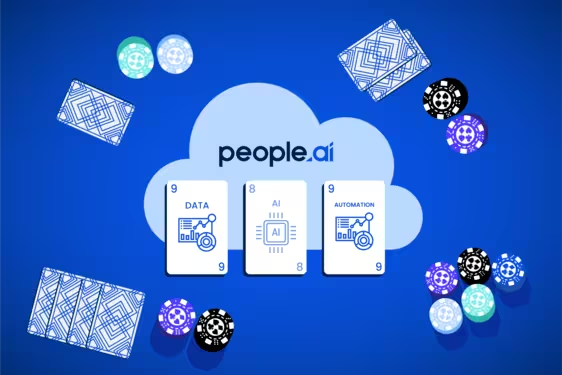A Harvard Business Review survey of 3,000 executives found that 60% believe their future relies on successfully implementing artificial intelligence—and that was in 2017. Today, that number has only grown as companies are realizing the value of AI for both GTM teams as well as the larger organization.
The good news? Boards and C-suites finally understand the value of AI for sales and marketing teams and the success of their organization as a whole. Yet while companies may see the value, that doesn't always ladder up to a shared understanding of how they'll implement the technology.
Let’s take a closer look at the five key ways companies are using AI in their sales strategies.
- Accelerated onboarding
Rep onboarding can be—and usually is—a challenge to accomplish quickly and efficiently, especially if you sell a complicated or expensive product with a long sales cycle. Ramping gets slower as the angle of the ramp gets steeper.
AI can automatically detect patterns in the sales activities and actions used by your best performing reps, turning those data points into valuable insights for managers. Not only do these insights lead to more wins but it also gives sales managers a tested blueprint for coaching and ramping.
MongoDB, for example, used Chorus.ai to accelerate ramp time for new reps from 7-9 months to just 2-4 months by giving reps access to valuable insights that help them through one of the most challenging parts of the Mongo sales process: discovery. Instead of having to wade through endless discovery call recordings to dig up what worked and what didn’t, Chorus.ai did it for them.
- Pipeline visibility
In 2015 the most recurring theme in a sales rep's life was the old shoulder tap at the cubicle and the inevitable question that followed: "What's going on with your deals?"
Today, AI solves the pipeline visibility problem by automatically capturing and surfacing the activities sales professionals engage in across opportunities or accounts. Not only does this eliminate the reliance on manually entered data but it provides managers with real-time answers to what's already happened and what's left to do.
Take Create Anywhere, for example. They too struggled with knowledge gaps when it came to where their reps were spending their time and with who. By leveraging AI sales leaders were able to see a real breakdown of activities and time spent across their team's deals, as well as the personas that were most engaged at each stage.
- Qualifying Leads
AI is great for surfacing bonafide lead insights from your marketing and sales data. AI-based tools can tell you more about your prospects and customers and also recommend which leads to pursue.
One particularly creative way companies are using AI to qualify leads is through AI assistants. Drift, for example, has been using AI-powered chatbots to enhance the buyer journey and scale its SDR team. Chatbots use AI to replicate and scale the behaviors of top SDRs so that engagement with every single website visitor feels personal.
AI-based chatbots can also:
- Highlight buyer pain points to make future person-to-person sales conversations more effective and contextual.
- Accelerate the buyer’s journey by answering open-ended questions that get leads faster through the funnel.
- Sales team productivity
AI does the dirty work for you. The dirty work we’re referring to, in this case, is the hassle of wrangling every single person you’ve talked to on a deal, including their title and seniority, and tying them to the right opportunity in Salesforce.
Generally speaking, reps capture maybe two to three people and that's it. But AI can intelligently detect contacts involved in conversations and create Opportunity Contact Records (OCRs) that are matched to the right opportunity in Salesforce.
By automating this process, productivity increases because reps spend less time on manual data entry and more time focusing on the actions they need to take—and the people they need to take them with—to move deals forward.
Five9 has saved sellers thousands of hours of manual data entry after implementing an AI-based platform that automated business activity and contact capture as well as opportunity matching within Salesforce. This resulted in 20% of a rep's time given back to them to re-focus their efforts around proven sales activities rather than more data entry.
- Customer success
According to HubSpot, 93% of customers are more likely to be repeat customers at companies with excellent customer service. The other side of that coin, of course, is that customer expectations have never been higher.
AI helps companies with customer success the same way it helps with sales team productivity and alignment: by analyzing behaviors, identifying patterns, and surfacing actionable insights that drive customers to keep renewing. AI also applies predictive analytics to provide things like churn warnings and renewal alerts. Talkdesk, for example, uses AI to optimize the customer experience via virtual agents that can recommend the best actions to take to resolve key customer issues.
These are just a few examples of how companies are using AI in practical ways to help GTM teams hit or exceed goals while driving a stronger understanding of what customers and buyers care about.
Related Insights
Explore more expert insights on AI adoption, sales execution, and revenue intelligence to help your team close more deals with confidence.



